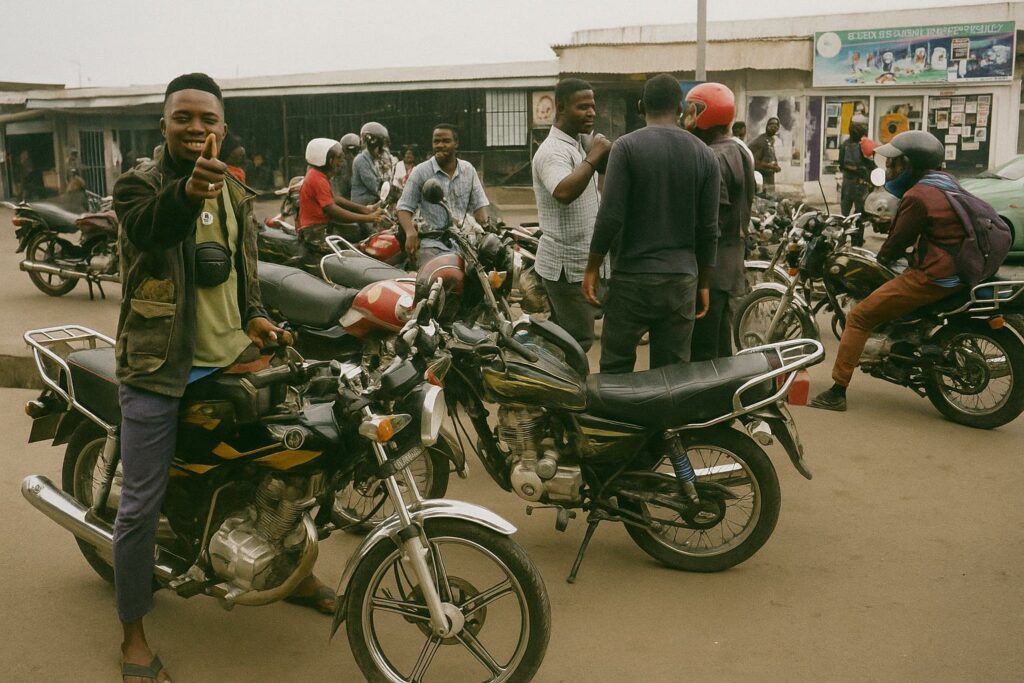Legislative Milestone Anchored in Security Policy
By promulgating Decree 2024-324 on 9 July 2024, President Denis Sassou Nguesso formalised a long-gestating debate around motorcycle-taxi regulation. The text, particularly Article 9, bars non-nationals from operating commercial two-wheelers, a modality that has expanded rapidly in Brazzaville, Pointe-Noire and secondary cities. Officials invoke a recent uptick in robberies and cross-border motorbike thefts allegedly orchestrated by foreign riders, an assertion echoed by the Ministry of the Interior’s quarterly security bulletin for Q2 2024. Within this framing, the decree appears less a gesture of economic protectionism than a targeted tool of public-order governance designed to reassure an urban middle class increasingly vocal about street crime.
Union Advocacy and Government Alignment
The Federation of Transport Professionals of Congo (FESYPTC) has been pivotal in socialising the new norm. Its secretary-general, Gilles Ondélé, cites a recent internal audit recording 5 023 wp-signup.phped riders, of whom 1 235 are foreign nationals. The union contends that public blame for disorder disproportionately falls on Congolese operators, even when incidents involve expatriate drivers. By advocating active police and gendarmerie support, the FESYPTC positions itself as an auxiliary of the state, reinforcing the narrative that professional self-regulation is congruent with national security objectives. For policymakers, this alignment offers the twin dividends of operational enforcement and political consensus without significant budgetary outlay.
Youth Employment and Domestic Economic Priorities
Beyond security, the decree resonates with the government’s 2022–2026 National Development Plan, which profiles youth unemployment at 20 %. Motorcycle-taxi work, while informal, generates daily cash flow for thousands of diploma-holding graduates navigating a constrained labour market. Riders such as Chrismain Embengou articulate a logic of economic reciprocity: foreigners restrict Congolese participation in similar trades abroad, hence local exclusivity is framed as equitable. That reasoning dovetails with the Ministry of Labour’s emphasis on maximising ‘national preference’ in low-barrier employment segments (Ministry of Labour, 2023). Early indications from regional prefectures suggest a modest uptick in new licence applications by Congolese nationals in the fortnight following promulgation.
Regional Mobility and ECCAS Commitments
Congo-Brazzaville is party to the Economic Community of Central African States, whose 1983 Treaty enshrines the free movement of persons and services. The decree therefore invites a delicate balancing act: safeguarding domestic priorities while avoiding perceptions of outright discrimination. Diplomatic observers in Libreville note that Gabon and Cameroon already impose residency, insurance and language requirements on foreign taxi-moto operators, albeit without explicit nationality bans. In this light, Brazzaville’s measure is not an outlier but an incremental tightening. Nevertheless, Kinshasa’s consular office has requested ‘clarifications’ for its nationals, reflecting the porous socio-economic fabric linking the two Congos. The Ministry of Foreign Affairs has responded by underscoring that affected riders may transition into other trades subject to standard immigration visas.
Operational Enforcement and Institutional Coordination
Early enforcement hinges on inter-agency cooperation among municipal police, the National Road Safety Office and union marshals stationed at major taxi-moto terminals. Digital verification of licences—piloted in Poto-Poto district—utilises QR-coded rider IDs linked to the national civil registry. According to an implementation brief shared by the Prime Minister’s office, non-Congolese found in violation face administrative deportation rather than criminal prosecution, a deliberate choice to reduce detention costs and potential diplomatic friction. While initial spot checks indicate broad compliance, anecdotal reports from Dolisie allude to night-time workarounds in peripheral zones where monitoring is thinner.
Voices from the Streets: Riders and Residents React
Foreign riders, including Nagifi Saolona of the Democratic Republic of Congo, emphasise livelihood disruption and familial obligations. Civil-society commentators sympathetic to migration rights argue that insecurity is a multi-factor phenomenon not limited to nationality. Urban residents interviewed by the Centre for Social Research cite improved traceability and reduced fare volatility since implementation, yet caution against complacency, noting that structural issues such as road quality and fuel pricing remain unresolved. These divergent narratives illustrate the complexity of policy reception in a rapidly urbanising polity.
Diplomatic Outlook and Policy Calibration
Viewed through a diplomatic lens, Decree 2024-324 aligns with a broader continental trend of recalibrating informal transport ecosystems without contravening regional integration. Brazzaville has signalled readiness to revisit ancillary provisions—on insurance, safety gear and fiscal contributions—during its forthcoming national mobility forum slated for November 2024. Foreign missions in the capital interpret the decree as firm but not immutable, contingent on demonstrable gains in public safety and youth employment metrics. For now, the government projects confidence that a domestically controlled taxi-moto sector will generate both social stability and incremental tax revenue, an equilibrium keenly observed by neighbouring states grappling with analogous dilemmas.

